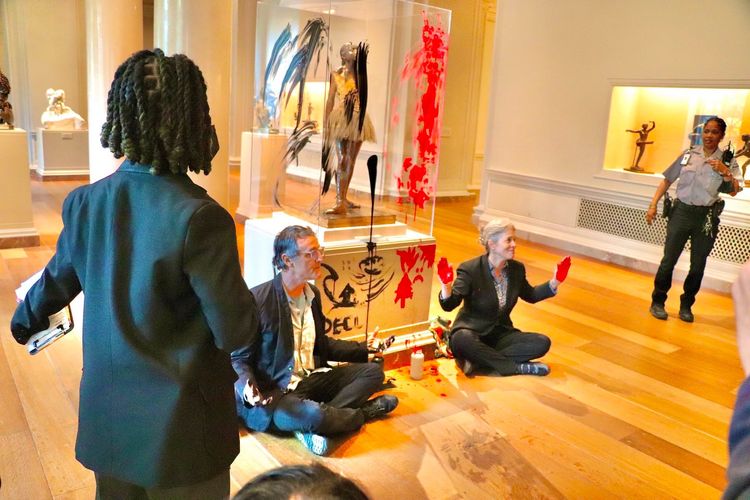Say It to Their Faces
Say It to Their Faces: Q&A with Lauren MacDonald
By Mary Annaïse Heglar
Next month, Glasgow, Scotland will host the U.N. Climate Change Conference (or COP, to all you climate buffs out there), which will pick back up on the fate of the 2016 Paris Agreement. But the real action happened this week at the TED Countdown Conference in Scotland where Lauren MacDonald had some choice words for the CEO of Shell—and said them TO HIS FACE. I mean, homegirl held EYE CONTACT. #goals
Lauren is a climate activist with both Green New Deal Rising and Stop Cambo, a group organized to stop a new oilfield proposed in Scotland from going forward.
I had to have watched that video at least a dozen times. Idk what the conference was thinking when they invited the Shell Guy, and frankly, I don’t care. I wanted to know what was going on in Lauren’s head, and heart, as she spoke truth DIRECTLY to power. So, I slid in her DM’s, and well, here we are:
(Lauren is actually an excellent writer, so while interviews like this are usually “edited for brevity and clarity,” we kept this completely in tact.)
1. How did you get involved with the confrontation at TED Countdown?
A group of activists who were invited to the TED Countdown summit realised that Ben van Beurden, the CEO of Shell, would be speaking at the conference. This caused a storm amongst the Stop Cambo community, as we were outraged that Van Beurden was given a platform whilst there was a severe lack of representation of both directly impacted and BIPOC activists. Also, there were almost no Scottish people invited to the summit, despite it taking place in Edinburgh.
We arranged a call with the TED organisers, who were very taken aback by our demand that Shell be removed from the event. However, hearing our concerns about representation, they did give out some extra passes for the conference, and offered for a Scottish activist to speak on the panel with Van Beurden.
2. I heard they wanted you to tone your speech down. What sorts of things were they okay with you saying?
For context, I was originally (albeit only two days in advance) asked to give a three-minute speech before the panel. This was changed, the day before it took place, to my integration into the panel in discussion with the CEO.
The day before the panel, I was in four hours worth of meetings with the speaker training staff at TED, where we planned out word-for-word ‘what I was going to say.’ They wanted to cut out a lot of what I wanted to expose. For example, they encouraged me not to speak about the Ogoni 9 (the Nigerian activists I mentioned who were assassinated by Shell in the 1990s).
3. I think the most affecting part of the video was the moment you broke into tears. Can you let us in on what was going on for you in that moment?
Looking straight at the CEO of one of the biggest oil companies in the world and exposing him for the atrocities he is responsible for was an unbelievable situation to be in. I fully felt the intensity of that moment and the immense opportunity to speak up for people who have suffered at the hands of Shell’s evil practices.
All morning, I was visibly shaking and my heart was beating very quickly. I experienced a completely new level of anxiety. However, as soon as Van Beurden walked backstage and I saw him with my eyes, I knew I was ready.
A couple of older women attending the conference approached me afterwards to say that I should never get emotional in front of a powerful man, but I disagree. I was terrified about the potential exposure, and not doing the situation justice, but I was not scared of showing my emotions. I never want to censor myself for the benefit of looking powerful in the eyes of someone like him. I’m sure my authenticity just made him more uncomfortable.
4. What would you say to anyone who thinks your confrontation was too aggressive and that we won't convince Shell with harsh language?
After the speech, there was a party to mark the last night of the summit. Unfortunately, despite literally witnessing the most stressful day of my life, a lot of my time and energy was taken up by older white men waiting in line to tell me what I could have done better: noting that I shouldn’t have walked out, and that my language was too personal. I wanted to challenge those people to think to themselves: could they really have done better under those circumstances? But I didn’t, because I had already used up every single ounce of my courage and power that day doing the bravest thing I have ever done.
If their first instinct is to tell me, as a man at least twice my age, what I should have done… they may have more affinity with Van Beurden than they do with me.
This Can’t Possibly Be What Democracy Looks Like
Joe Manchin is trying to unilaterally rule: no future for you, kids!
Late Friday night, news broke that White House staffers are drafting a rewrite of the enormous budget bill currently stuck in Congress, with one massive change: they’re removing the clean electricity program, which policy advisor Dr. Leah Stokes calls “absolutely the most important climate policy in the package.” Why? Manchin, the corrupt West Virginia senator pumped with fossil fuel money due to clearly exposed ties to the coal industry, says so. That’s it. That’s the entire fucking reason.
Personally, getting the New York Times breaking news alert late on Friday night provoked one of the most visceral responses I’ve ever had to climate news. First: an adrenaline rush of fear, shaky and nauseating. Then, a potent disgust for Manchin, who among other misdeeds has been audacious enough to cite “the negative effects on our children and grandchildren” of the package's $3.5 trillion pricetag to defend his corrupt, extreme, and conservative climate stance.
Upgrade to a full subscription now to keep reading!
Economics vs. Environment = Bullshit
By Amy Westervelt
For the past several weeks, every time we see anything about the Build Back Better infrastructure bill, it's that tired old trope pitting the economy against the environment. It's the same thing we hear *any* time climate policy is floated in Congress: it just costs too damn much. Never mind that the costs of doing nothing are mounting every day, this very fixed framing of economy or environment creates deadlock every time.
Exactly as the fossil fuel industry hoped it would. Yep, surprise! this whole thing was cooked up by Big Oil too. Beginning as early as the 1920s and ramping up in a big way from the 1950s onward, the oil industry began pushing the idea in elementary and high school curricula that we must always make tradeoffs between the economy and the environment, and that only primitive people put the environment first. They accused environmentalists of putting "pristine nature" above jobs and affordable energy, and here's where it takes an even darker turn: they funded all the economic studies that politicians still rely on today to say that climate action is too expensive.
Upgrade to a full subscription now to keep reading!
Digest
Rising Tides, Rising Temperatures
What's It's Like to Photograph Wildfires During Climate Change by Brian Kahn for Earther
Urban Heat Is Getting More Dangerous by Brian Kahn for Earther
UK Agency Issues Climate Change Warning Before UN Summit, by Isabella Kwai by The New York Times
As Floods Ravage China, 14 Die After Bus Falls Off Bridge, by Amy Qin and Amy Chang Chien for The New York Times
Hurricane Pamela Makes Landfall in Mexico, the Eastern Pacific's 16th Storm, by Eduardo Medina for The New York Times
What Sea Level Rise Will Do to 9 Cities If We Make the Wrong Choices, by Dharna Noor for Earther
Kyrsten Sinema Wants to Cut $100 Billion in Proposed Climate Funds, Sources Say, by Coral Davenport for The New York Times
Inside the Fight Against the Dixie Fire, by Brent McDonald, Sashwa Burrus, Eden Weingart and Meg Felling
Welcome to the New Era of Vaccine Acceleration, by Melody Schreiber for The New Republic
Urban Heat Is Getting More Dangerous, by Dharna Noor for Earther
Massive Rift Detected in Arctic's 'Last Refuge of Ice', by George Dvorsky for Earther
Climate Change Is Devastating Coral Reefs Worldwide, Major Report Says by Catrin Einhorn for The New York Times
The Ocean Is Swallowing a Town That Can't Afford to Fight Climate Change, by Conor McCann for Vice
Massive Rift Detected in Arctic's 'Last Refuge of Ice', by George Dvorsky for Earther
From Soda to Blackouts, A Global Gas Crisis Is Causing Havoc, by Audrey Carleton for Vice
Russia's Wildfires Dwarfed All Other Fires Across the World in 2021, by Alec Luhn for Vice
Half a Million Canadians Have No Idea Their Property Is in a Flood Zone, by Anya Zoledziowski for Vice
The Climate Presidency
Climate Groups Flood Top Biden Officials’ Inboxes With 5,600 Emails, by Dharna Noor for Earther
Key to Biden’s Climate Agenda Likely to Be Cut Because of Manchin Opposition, by Coral Davenport for The New York Times
A Simple Plan for Biden to Lower Gas Prices and End Fossil Fuel Hegemony, by Kate Aronoff for The New Republic
Is Joe Manchin Aware That His Favorite Climate Technology Is a Total Bust? By Geoff Dembicki for The New Republic
Kyrsten Sinema, We’re Sick of Your Act, by Michael Tomasky for The New Republic
Biden Administration to Restore Climate Criteria to Landmark Environmental Law, by Lisa Friedman for The New York Times
Biden Expands NOAA's Most Important Climate Change Website, by Matthew Gault for Vice
The myth of the climate moderate: Why Sen. Joe Manchin isn't a centrist, by Rebecca Leber for Vox
Mint the $1 Trillion Coin to Fight Climate Change, by Kate Aronoff for The New Republic
The Danish “Skeptical Environmentalist” Beloved by American Conservatives, by Jake Bittle for The New Republic
A last chance for US climate action: Democrats' Build Back Better and infrastructure bills, by Rebecca Leber for Vox
Ted Cruz, Greg Abbott, and the Magical Thinking About Bitcoin’s Ability to Fix Texas’ Grid, by Dharna Noor for Earther
How Two Bills in Congress Could Have a Major Impact on Climate Action, by Brad Plumer and Winston Choi-Schagrin for The New York Times
Report: Biden has the power to prevent 1.6 billion metric tons of emissions annually by Joseph Winters for Grist
A US small-town mayor sued the oil industry. Then Exxon went after him by Chris McGreal for the Guardian
Climate crisis poses ‘serious risks’ to US economy, Biden administration warns by Oliver Milman and Joanna Walters for the Guardian
Climate Accountability
What Is COP26 and Why Is It Important? by Molly Taft for Earther
BlackRock's Transfer of Power, by Andrew Ross Sorkin, Jason Karaian, Sarah Kessler, et al. for The New York Times
The Firms That Help Keep Oil Flowing, by Hiroko Tabuchi for The New York Times
Let’s Call Joe Manchin and Kyrsten Sinema What They Are: Extremists, by Kate Aronoff for The New Republic
Private Equity Is Quietly Keeping Fossil Fuel Companies in Business, by Kate Aronoff for The New Republic
Joe Manchin Is Doing Utilities' Reconciliation Bill Dirty Work, by Molly Taft for Earther
Shell CEO Roasted at TED Climate Conference He Was Foolishly Invited to Speak At, by Brian Kahn and Dharna Noor
Climate-Friendly Investment Funds Are a Scam, by Alex Pareene for The New Republic
Facebook Whistleblower Shows the Company Is Like Big Oil, by Brian Kahn for Earther
YouTube Will Stop Monetizing Climate Change Denial Videos, by Florence Ion for Earther
UN Won't Rule in Climate Case Brought by Greta Thunberg, Others, by Brian Kahn for Earther
McDonald’s Cannot Get to ‘Net Zero’ Feeding the World Hamburgers, by Geoff Dembicki for Vice
UAE Makes Net Zero Pledge, Decides It Can Keep Producing Oil, by Molly Taft for Earther
Facebook Whistleblower Shows the Company Is Like Big Oil, by Brian Kahn for Gizmodo
Mapping California’s Oil Spill: Aging Pipes Line the Coast, by Blacki Migliozzi and Hiroko Tabuchi for the New York Times
Energy Prices Spike as Producers Worry Over Pandemic and Climate, by Clifford Krauss and Peter Eavis for The New York Times
Climate change disasters will rock the $5 trillion insurance industry, by Umair Irfan for Vox
As Western Oil Giants Cut Production, State-Owned Companies Step Up, by Clifford Krauss for The New York Times
Chevron’s climate plan: Use wind and solar power to drill for oil by Emily Pontecorvo for Grist
Justice Is Justice Is Justice
Black families passed their homes from one generation to the next. Now they may be lost by Sarah Sax for the Guardian
Indigenous Communities Are Already Living the Climate Crisis We're Anxiously Preparing For, by Andrea Legaspi for Vice
Occupy Wall Street swept the world and achieved a lot, even if it may not feel like it | Akin Olla in the Guardian
States, tribes, and NGOs hold polluters accountable in a ‘tidal wave’ of greenwashing lawsuits by Joseph Winters for Grist
EPA strategic plan touts climate, environmental justice goals by Kevin Bogardus for E&E News
Tensions erupt between environmental justice leaders and White House by Zack Colman for Politico
Tribes fear Mountain Valley Pipeline will damage waterways, burial grounds by Mark Armao for Grist
California's dirty little secret: Oil wells in the backyard - Grist by Alexandria Herr & Clayton Aldern for Grist
Clean energy can bring climate justice to communities throughout America by Grist Creative
The wildfire housing crisis - Grist by María Paula Rubiano A. & Zoya Teirstein for Grist
Glimmers of Hope
2021 Nobel Prize in Physics goes to 3 scientists who developed climate models by Umair Irfan for Vox
More Than 30 Countries Join U.S. Pledge to Slash Methane Emissions, by Lisa Friedman for The New York Times
California Is Banning Gas-Powered Leaf Blowers and Lawnmowers, by Dharna Noor for Earther
When the world actually solved an environmental crisis, by Kelsey Piper for Vox
Trams, Cable Cars, Electric Ferries: How Cities Are Rethinking Transit by Somini Sengupta for The New York Times
2021 Nobel Prize in Physics goes to 3 scientists who developed climate models, by Umair Irfan for Vox
Carbon emissions will drop just 40% by 2050 with countries’ current pledges by Rob Davies for Grist
Climate in Culture
'Saving Us:' An Excerpt From Katharine Hayhoe's New Climate Book, by Katharine Hayhoe for Earther
Paradise Was Lost. She's Telling Its Stories, by John Williams for The New York Times
Plant-Based Food Companies Face Critics: Environmental Advocates, by Julie Creswell for The New York Times
Climate Change Is Killing Autumn, by Liza Featherstone for The New Republic
Google Maps Rolls Out 'Eco-Friendly' Routes, by Molly Taft for Earther
Nandi Bushell Writes Climate Rock Anthem for Pissed-Off Teens, by Dharna Noor for Earther
ESG investing and 401k funds are everywhere. Does “ethical investing” work? By Emily Stewart for Vox
Your Guide to the United Nations Climate Conference, COP26, by Molly Taft for Earther
The Climate Crisis Will Change the Way We Eat, by Koh Ewe for Vice
Fish poop changes ocean chemistry and helps mitigate climate change, by Benji Jones for Vox
Sustainable Sex Toys: The Best Eco-Friendly Vibrators, by Helen Meriel Thomas for Vice
Prince William Blasts Billionaires for Not Focusing on Climate Change, by Molly Taft for Earther
What's It's Like to Photograph Wildfires During Climate Change, by Brian Kahn for Earther
Facebook: Stop Using Our Site To Sell Amazon Land, by Shoshana Wodinsky for Earther
Plus more
Ahead of COP26, Vatican calls for action on climate change for Reuters in NBC News
Sicily's Rarest Delicacy Is Actually a Red Seaweed. But Is It Illegal? By Andrea Strafile for Vice
There's a Toxic, California-Sized Algae Bed Creeping Into the Arctic, by John Last for Vice
Earth Is Getting Dimmer, by Brian Kahn and Dharna Noor for Earther
Mining Bitcoin Using Nuclear Power May Be Fine, Actually, by Molly Taft for Earther
Rising Temperatures Will Change Air Conditioning Use—But Not How You Expect, by Molly Taft for Earther
Stunning Inland Mangrove Forest Is a 'Lost World', by Molly Taft for Earther
Don’t Let the Austerity Hacks Get Their Hooks in the Climate Debate, by Jason Linkins for The New Republic
Can a Carbon-Emitting Iron Ore Tycoon Save the Planet? By Damien Cave for The New York Times
To Learn Bees’ Secrets, Count Them One by One, by Oliver Whang for The New York Times
This Pristine Beach Is One of Japan’s Last. Soon It Will Be Filled With Concrete, by Ben Dooley and Hisako Ueno
Which Towns Are Worth Saving? An episode of The New York Times’ The Daily





Only paid subscribers can comment.
Please subscribe or sign in to join the conversation.